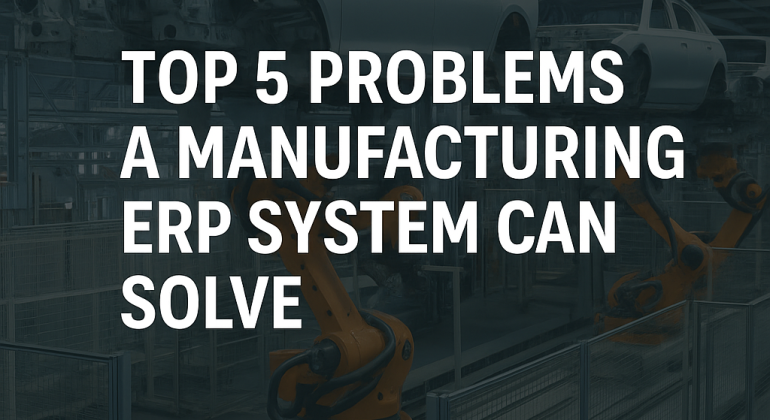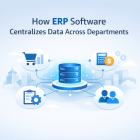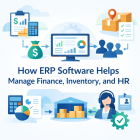Top 5 Problems a Manufacturing ERP System Can Solve
Manufacturing involves many moving parts, from handling raw materials to delivering the final product. Even small delays or errors can lead to big losses. That’s why many manufacturers now rely on a Manufacturing ERP System to streamline their operations.
A Manufacturing ERP System brings together all your processes into one platform. It manages inventory, production, planning, finance, quality control, and more. This helps avoid common problems that slow down growth and hurt profits.
Here are five key manufacturing problems that can be solved by using a Manufacturing ERP Solution.
1. Inventory Problems and Material Wastage
Poor inventory control causes production delays, overstocking, and expired raw materials. When materials aren’t tracked properly, businesses either run out of stock or waste money on unused items.
A Manufacturing ERP System offers real-time inventory management. It shows exactly how much stock is available, what’s in use, and what needs to be reordered. You can set alerts for low stock levels and automate your purchase orders.
It also supports batch and expiry tracking, helping you use older materials first. This reduces spoilage and keeps storage costs under control. As a result, you get better material planning and less waste.
2. Unclear Production Schedules
Without a proper production schedule, operations get messy. Machines may sit idle, workers get confused, and deadlines are missed. Delayed production also affects order delivery and customer satisfaction.
An ERP system for manufacturing allows you to create clear and accurate production schedules. You can plan jobs based on material availability, machine capacity, and delivery deadlines. This helps avoid bottlenecks and improves overall productivity.
When unexpected changes occur, like machine failure or a rush order, the system helps you adjust the schedule. Everyone stays informed, and work continues smoothly.
3. Lack of Traceability and Quality Issues
In case of a defective product, it’s hard to trace the root cause without proper records. Was it a material issue? A machine fault? A human error?
With a Manufacturing ERP System, each batch and item is tracked across every stage. You can trace back the materials used, the employees involved, and the exact machine that processed it. This makes it easier to find the problem quickly and fix it.
The system also includes quality control features. You can set checkpoints, record inspection results, and create rules for accepting or rejecting products. This improves product quality and helps avoid rework or recalls.
4. Delayed Decisions Due to Disconnected Data
Many manufacturers use different software for each department. Sales, finance, inventory, and production teams work in silos. This causes confusion, delays, and miscommunication.
A Manufacturing ERP System brings all departments onto one platform. Everyone works with the same data in real time. If sales get a new order, the production team can instantly check inventory and plan the job.
You also get real-time dashboards and reports. Managers can make faster and better decisions based on live data, not outdated spreadsheets. This improves coordination and speeds up operations.
5. Difficulty Tracking Production Costs and Profits
If you don’t track your costs properly, you don’t know how much profit you’re making. Many manufacturers miss hidden costs like machine usage, labor hours, packaging, and repairs. These add up and reduce your margins.
A Manufacturing ERP System tracks every cost involved in production. You can see how much each product or batch costs to make. This includes raw material, labor, machine time, and overheads.
With this data, you can price your products more accurately and find ways to reduce costs. You can also identify your most profitable products and focus on them to grow your business.
How Finac ERP Solves These Problems
Finac ERP is built to support manufacturers in solving real business challenges. It offers a full Manufacturing ERP System with tools for inventory, production, quality control, cost management, and more.
Finac ERP connects all your departments into one simple platform. It helps avoid errors, reduce delays, and improve productivity. Some key features include:
- Real-time inventory and stock tracking
- Smart production scheduling tools
- Batch and expiry management
- Quality checkpoints and inspection logs
- Live cost tracking and financial reports
Finac ERP is user-friendly and designed for growing manufacturers. Whether you run a small workshop or a large factory, Finac adapts to your workflow.
Final Thoughts
It’s definitely not easy running a manufacturing business. Mistakes can be costly, and delays can cause customers to lose. A Manufacturing ERP System brings structure, clarity, and control to your operations..
If you want to simplify your manufacturing process and grow faster, now is the time to make the switch to Finac ERP.
Get in touch with Finac ERP today and see how it can transform your business.







Recent Comments